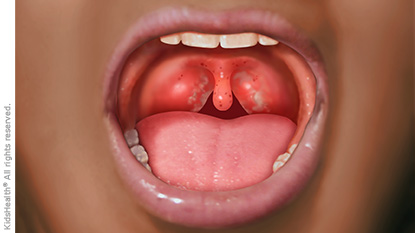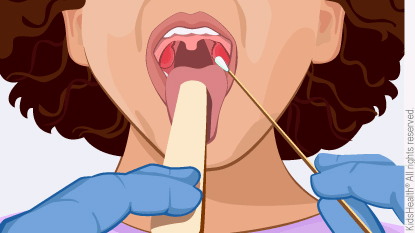Tonsillitis
What Is Tonsillitis?
Tonsillitis (pronounced: tahn-suh-LYE-tus) is an inflammation of the tonsils, usually caused by an infection by viruses or bacteria.
Tonsils are lumps of tissue on both sides of the back of the throat that help the immune system protect the body from infections. But sometimes infections are too much for the tonsils to handle, and these fighters of infection become infected themselves.
Infected tonsils get swollen and red, and have a yellow or white coating. A person with tonsillitis may have a sore throat, fever, swollen glands in the neck, and trouble swallowing.
What Are the Signs & Symptoms of Tonsillitis?
Inflamed tonsils look red and swollen, and may be covered with a yellow or whitish coating or spots. Someone with tonsillitis may have:

- a sore throat, which can be mild to severe
- white spots or pus on the tonsils
- swollen lymph nodes (sometimes called swollen “glands”) in the neck
- voice changes
- a fever
- painful swallowing
- stomachache
- headache
If you have symptoms of tonsillitis, call your doctor.
What Causes Tonsillitis?
Tonsillitis is usually caused by a virus such as:
Bacteria also can cause it, most commonly group A streptococcus (then, it is called strep throat). Rarely, tonsillitis can be caused by something other than an infection.
How Is Tonsillitis Diagnosed?
Your doctor will ask about your symptoms and examine your throat and neck. Your doctor may use a soft cotton swab to gently collect a sample from your tonsils and the back of your throat for testing.
It's important for your doctor to know if bacteria are causing the infection. If you have strep throat, you'll need treatment with antibiotics to kill the bacteria. This will help you feel better and prevent other problems that can come from untreated strep throat.

How Is Tonsillitis Treated?
If your doctor prescribes antibiotics, be sure to follow the directions carefully. Finish taking all the medicine even if your symptoms go away and you feel better, or the infection could come back. This also helps prevent other health problems that group A strep can cause, such as rheumatic fever (which can damage the heart), kidney disease, or more serious infections in other parts of the body.
If a strep test comes back negative, it's probably a virus causing the tonsillitis and antibiotics won't help. Just like with a cold (also caused by a virus), you'll have to take it easy for several days and let the virus run its course.
Rarely, if someone gets tonsillitis a lot, the doctor or an otolaryngologist (pronounced: oh-toe-lar-un-GA-luh-jist, a doctor who specializes in ear, nose, and throat problems) may recommend a tonsillectomy (pronounced: tahn-suh-LEK-tuh-mee). This is a surgery to remove the tonsils. Tonsillectomy used to be a common procedure, but now experts recommend watching and waiting because large tonsils often shrink on their own over time.
How Can I Feel Better?
Get plenty of rest and drink lots of fluids. You can take acetaminophen or ibuprofen to relieve any pain or discomfort. (Don't take aspirin or other products that contain aspirin, though, because these may put you at risk of developing Reye syndrome, an illness that can cause serious problems.)
Avoid smoking or anything that will irritate your throat. It's best to drink lots of liquids. You may prefer softer foods, like applesauce, flavored gelatin, or ice cream. If you don't feel like eating, try drinking liquids that contain calories, such as fruit juices, milkshakes, and soups and broths.
If you're on antibiotics, you can go back to school after taking them for at least 12 hours and you no longer have a fever. If you're still feeling weak, tired, or achy, it may be best to stay home for another day or two.
How Can I Prevent Tonsillitis?
Tonsillitis is contagious. Talking, sneezing, coughing, or shaking hands can pass the germ causing the illness from one person to the next.
To protect yourself from catching tonsillitis or to prevent passing it to somebody else:
- Wash your hands well and often.
- If someone in your household or a friend has tonsillitis, don't use that person's cups, glasses, silverware, toothbrush, or other utensils. And if you have tonsillitis, keep your stuff separate and don't share it with anyone.
- Don't kiss anyone until you're completely over the tonsillitis.
- Get a new toothbrush after you feel better and are no longer contagious.
When Should I Call the Doctor?
Call your doctor right away if your condition gets worse; for example, if you have a hard time breathing or swallowing. If the sore throat gets worse, especially on one side, call your doctor. This could be a sign of a peritonsillar abscess.
Also talk to your doctor if your fever comes back or if you're not feeling better in a couple of days.
Reviewed by: Elana Pearl Ben-Joseph, MD
Date Reviewed: Mar 7, 2023
















